Tao Jiang and Sarah Budello are co-chairs of the Women at Leeds Network (WALN), a network for women at the University of Leeds. As part of the ALIGN HE conference, Tao and Sarah held a workshop on building community and belonging in staff networks, discussing the challenges faced and how to build momentum.
At White Rose, we want to support the building of networks and communities across our institutions to foster a sense of belonging and connection throughout the region.
Tao and Sarah have recently been awarded money from our Community Fund to organise a joint event with other women’s networks at the University of York and the University of Sheffield.
We asked them more about these plans plus how they stay connected with the interests of their membership, as well as tips for running a successful staff network.
Tell us about Women at Leeds and your roles. How long have you both been co-chairs of the network?
Tao and I joined as co-chairs at the start of 2023, and it’s been such a joy to work together on building this network. We are lucky to have such a wonderful diversity of members who bring their expertise and experience to create engaging sessions. We also have so much fun running things – even when we are under a lot of pressure to keep everything going on top of our other roles!
We currently have around 1,600 members who are made up of staff and postgraduate researchers who identify as women and/or support women’s issues. We work closely with the Equality and Inclusion Unit (EIU) and have direct support from Prof Julia Bennell who acts as the Academic Lead for Gender. Together we ensure our events and initiatives are in alignment with the wider Equity, Diversity and Inclusion strategy to enable our network to have impact at both an individual and institutional level.
“The network is really a platform for members to share their experiences and achievements, to access development opportunities and information, to create community, and to have their voices heard by senior leadership during discussions about issues and policies that affect them.”
How does the network foster a sense of community among women from diverse roles and departments across the university?
We very much wanted this network to be led by its members, and to represent their varied challenges and lived experiences, so we started by reaching out and asking members what they wanted this network to be, what they needed, and how they needed us to turn up. Our session themes, and format (whether online or in person) are driven by our members needs and interests.
We run sessions on themes that will speak to many of our members such as women’s health issues, the gender pension gap, and career development. One simple but effective session we ran recently was a speed networking session, which was a great way of getting members from across the university talking and making connections.
We try to cater to a variety of interests, challenges and lived experiences from neurodiversity in women, to flexible working, to being childless by choice and not by choice. We don’t shy away from raw issues such as the sessions on honour-based abuse, gender-based violence and adult children of alcoholics. We try hard to provide lots of options and to make things as accessible as possible, although we are always learning and trying to do better.
Can you share some examples of successful events?
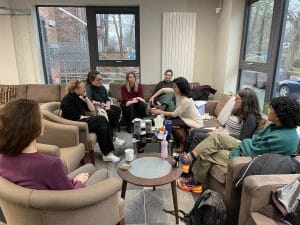
A chocolate tasting network event
Our in-person sessions have proven popular, such as the Winter Celebration ‘Keeping Warm and Staying Healthy’ which brought together staff to network, learn some dance moves, have a mini massage, eat together and learn some folk songs. Our speed networking event was also really wonderful – we had around 30+ members in the room, from different areas of the University. It was a great way to foster connection and build community and we will be doing more of these. We have had a great response from our online sessions as well, and our annual summer conference is always really fun! But don’t let us tell you how engaged our members are – here is a quote from a member from our Impact Report (23-24):
“WALN makes me feel connected, informed, and heard. The network breaks down barriers, provides a safe space for diverse viewpoints, and continues to advocate on our behalf across our different communities, faculties and services. I have built wider networks and developed a stronger sense of belonging at the university as a result of the network’s wide-ranging activities. Women at Leeds is special and long may its work continue!”
How do you navigate the challenges of engaging a busy workforce and maintaining momentum?
I think our presence on Microsoft Teams as a platform helps members engage when they can. Many staff already use this software for communication at Leeds, and we record appropriate sessions so that people can catch up later and don’t miss out. We try to balance a mix of online and offline sessions and vary the days we hold them so part-time staff and shift workers are considered. Tao and I work very hard to keep momentum going in the network and get great support from our committee and colleagues in the EIU.
We were originally four co-chairs with Jacki Willson and Hafsah Khalil when we started, but they both had to step away over the past year, so keeping up the momentum with just the two of us has been a challenge, but we are passionate about this network! We do our best to communicate all we are doing through the internal comms newsletter and have recently started working with other networks, such as our summer ‘Afternoon Tea Get- Together’ with the LGBT+ Network. Our working method is fundamentally collaborative, and sharing with others is important to the work that we do.
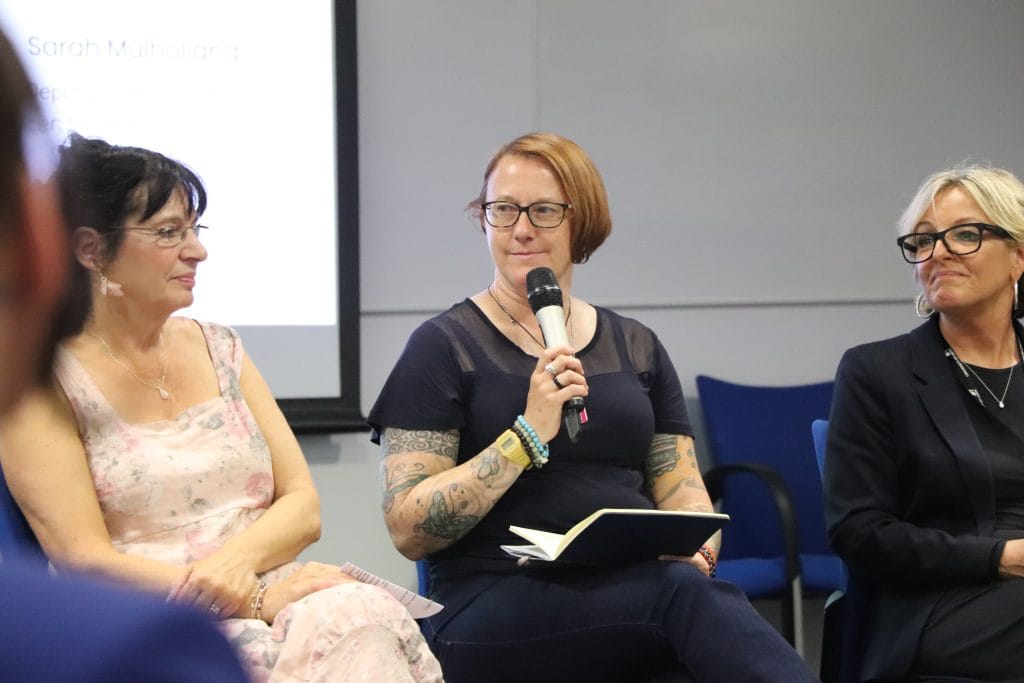
A network panel event
How do you measure the success and impact of your network?
This is an interesting question. Obviously, we work in a HE environment that is driven by research, and therefore the language our organisation speaks is statistics and data. And we do have some numbers that reflect success – our membership has grown by about 12% since we’ve been in post, we have a decent live turn out at our sessions, and one recorded session has over 100 views.
“However, for me impact is the feeling individuals take away when they engage with our network. If someone feels seen, understood, less alone, learns something new, makes a change or has a giggle when they interact with us, then we’ve been successful in what we are trying to achieve.”
We’ve seen our members benefit directly, such as Stephanie Siviter who went on to launch her services as a sobriety speaker after running a session for our network in which she shared her story of addiction and recovery. Personally, Tao and I have also seen the fruits of our labour as we have been asked to run workshops at the 2025 Align HE Conference and the 2025 Women in Higher Education Network conference, opportunities we have embraced and are very grateful for!
The network is clear in its mission, vision and values and we do want to show how we are having impact in reducing the gender pay gap and increasing women in leadership roles. We really appreciate the feedback we get from our members and view the positive comments as a measure of success and are always open to constructive comments to help us improve. You can also check out our Women at Leeds Network Impact Report about what we have been getting up to.
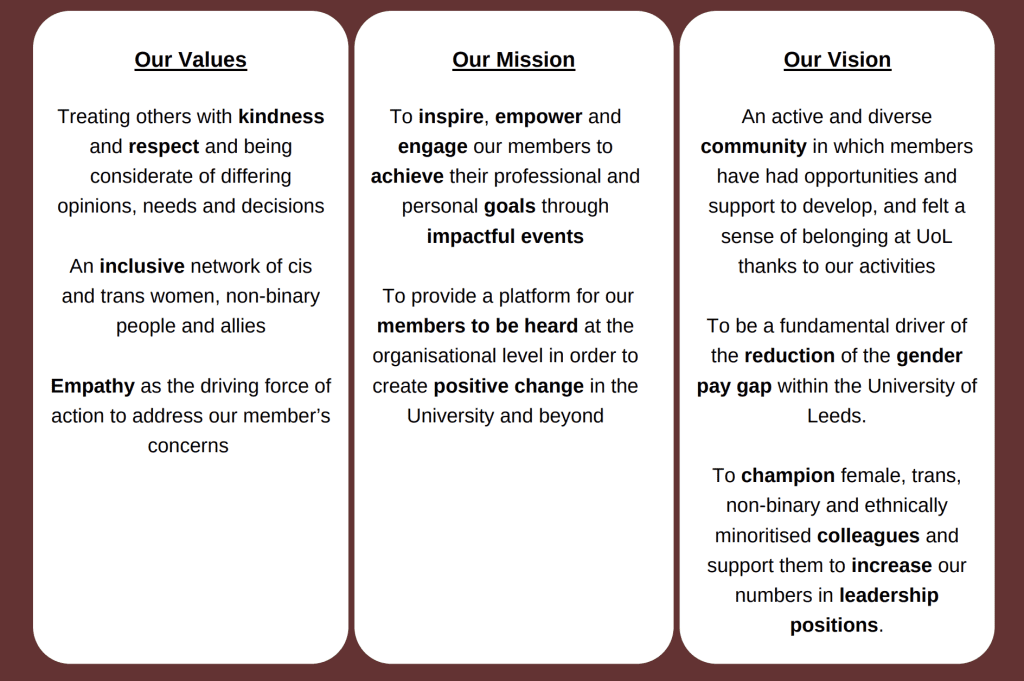
What are some common pitfalls to avoid when building and running a university network?
Thinking that no one is paying attention when you don’t get lots of online engagement.
We have learnt over the years that there are lots of people watching and listening but not actively engaging – but that when you ask them in the right way, at the right time, they will show up!
Be what you want to see.
The co-chairs and committee members of these spaces very much set the tone. When you have a huge diversity in membership, you can’t show up as a leader with a mentality of ‘I know what you will like’. Instead you have to ask what they need and want, and listen!
Remember you can never please everyone!
Even your best thought out, inclusive ideas will not please everyone. And that’s ok. Don’t take things too personally, ask for help, ask questions and learn from feedback. And don’t take yourself too seriously, these are friendly spaces after all, so posts about pets and favourite snacks are very welcome…
You’ve recently applied to our Community Fund to fund an event connecting women’s networks across the White Rose Community. Can you tell us more about these plans and your aspirations for this wider group?
Our way of working has always had collaboration at the heart of it which has involved reaching out to other universities, such as when we co-hosted the 2024 International Women’s Day event with Leeds Trinity. Tao has been driving the funding application for the Community Fund, and after a successful bid we are currently developing the ‘White Rose Women Connect’ event with the funds secured through Tao’s efforts! We want to use this event to establish and develop bonds between the three institutions, to learn best practice, share resources, and to discuss challenges facing women in UK higher education today. We are also hoping to use this event as a vehicle for further work on spotlighting women working in HE in the North… but that’s for another blog!
Looking ahead, what are your aspirations for the Women at Leeds?
We have managed to gain a lot of momentum over the past few years, and we are really proud of the work we have done to bring our members together. With our tenure as co-chairs coming to an end at the end of the year, we just hope that the next co-chairs will take on the theoretical torch and keep running!
“Keep listening, keep creating opportunities to get together and to develop our members both personally and professionally.”
We want the network to play an important role in achieving institutional objectives and to work closely with external and internal programmes that are working toward gender equity.
Related news
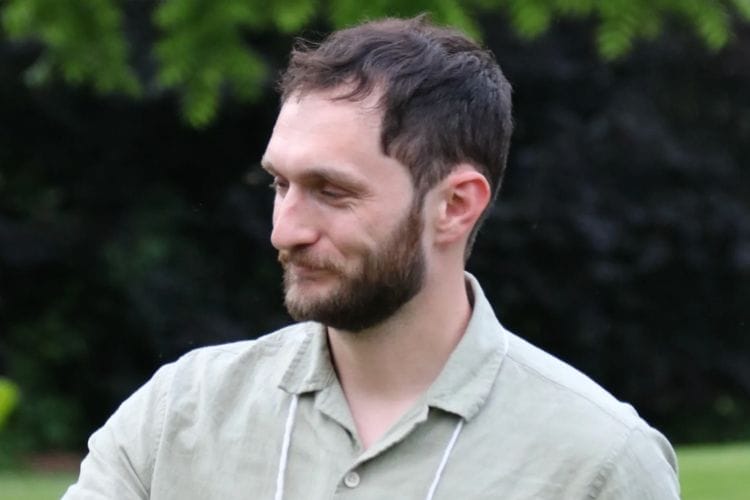
Spotlight on Prosper: Dr Fred Wilson-Spencer

Spotlight on leadership: Shareefa Fadhel, Equity in Leadership 2024 delegate
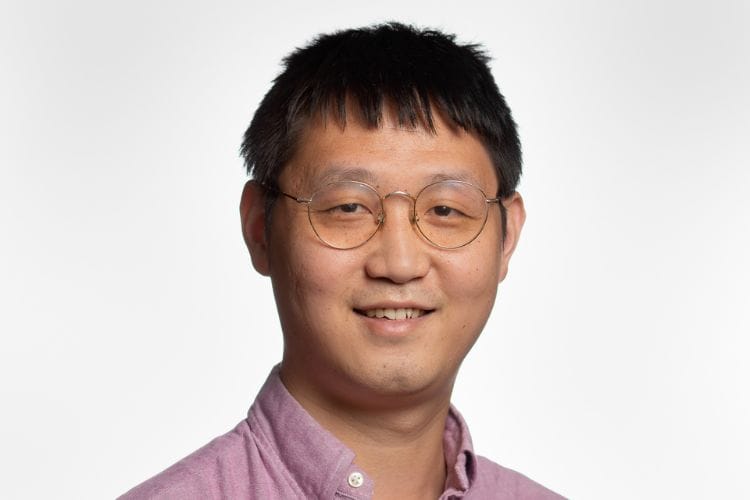
Spotlight on Equity in Leadership: Dr Jihong Zhu

Spotlight on Prosper: Dr Clare Danek




